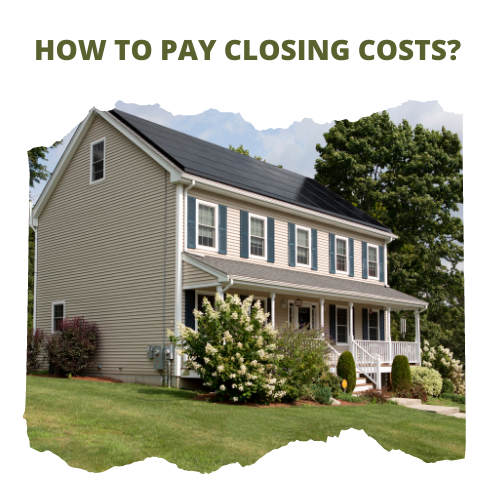
Best Tips:- Can You Pay Closing Costs With A Credit Card
Closing costs can be difficult to pay off some of the time. It is important to ensure that you have enough funds available in order not to default on your monthly mortgage payment.
Luckily, there are credit cards and other source available that allow you the option of paying for closing costs with a credit card, which will give you more time until the due date arrives.
Table of Contents
RELATED:- Can You Pay For Car Insurance With a Credit Card?
Understanding Closing Costs
What are closing costs?
Closing costs are the fees that are associated with the purchase or sale of a property. They vary depending on a number of factors, including the location of the property, the type of property, mortgage and the terms of the sale. Closing costs typically include a variety of items, such as the
- Cost of an appraisal, surveyors, and loan processors who worked on your mortgage.
- Title insurance and private mortgage insurance (PMI):- This are the first year of homeowner’s insurance,
- Loan origination fee: This is a fee charged by the lender to cover the cost of processing your loan.
- They can also include taxes and other government fees. Buyers and sellers should be aware of these costs and budget accordingly.
What will be your closing costs?
There are a variety of factors that go into calculating your closing costs. Generally, they will be between 2-5% of the purchase price of the home. However, there are a few additional fees that could apply in your situation. Which vary from state to state, and even from county to county,
For example, if ’applying for a $100,000 mortgage, you should expect to pay $2,000 to $5,000 at closing. In most cases, the exact amount of closing costs are find in the Loan Estimate that your lender tender after you submit a loan application.
How to pay closing costs?

There are many ways to pay closing costs on a home purchase. Currently thegood news is you have lots of options—and it doesn’t all have to come out of your pocket. Let’s look at some of the ways one can cover closing costs.
Pay closing costs by Ask your family for gift funds
One way to pay for your closing costs without taking out a loan is to ask your family for gift funds. If you have supportive parents, other relatives, or significant others can contribute to your closing costs This could be a great solution if you have a close-knit family who is able to help you out in this way.
You’ll need to provide your family with some information so they can make an informed decision about whether or not to give you the money. You’ll need to provide them with a written estimate of your closing costs.
This will include the total amount of the costs, as well as which ones your family will be responsible for. With this you dont need to pay back the money.
Pay closing costs from your savings or personal check
If you have enough money saved up, you can easily pay for your closing costs out of your pocket. This is the most common way to cover these costs, as it doesn’t require you to take on any extra debt.
However, if you don’t have enough money saved up, you can also pay for your closing costs with a personal check. This option is less common, but it can be a good way to avoid taking on extra debt. Keep in mind that the money must be in your personal banking account for at least 60 days before you accept your offer. Most lenders require minmun of two months of bank statements to show that you’ve saved this money before now. that is a process known as “seasoning” your funds.
Note:- Perhap, If you’re self-employed person, the money can also be transferred from your business account directly to the escrow or to the personal accounts, but you may need to “season” it for 60 days before closing. Ensure to talk with the loan officer beforehand to see what extra documentation may be required.
One option is to get a no-closing-cost mortgage. This is a mortgage in which the lender agrees not to charge the typical fees associated with a mortgage, such as origination fees, document fees, and appraisal fees. Lenders make up for this by charging a higher interest rate.
Another option is to have the seller pay your closing costs. This is often done when the seller is anxious to unload the property
Pay closing costs by Ask for a seller credit.
Another convenient way to pay for your closing costs is to ask the seller for a credit. This can be a tricky proposition, as the seller may or may not want to do this. In many cases, the seller will be more likely to agree if you have a pre-approved mortgage in hand. and also offering him higher purchase price at the same time.
Though with the conventional, FHA, VA, and USDA loans, you can comfortably ask a seller to cover part or all the closing costs, using part of the money they earn from the sale of their property. Note that this pattern only works best, if a buyer’s market where the seller is not receiving multiple offers. In a seller’s market, the seller may not likely to make concessions and will most likely choose another offer.
If you do get the seller to agree to a credit, it’s important to have a plan for how you will use that money. You don’t want to blow it all on closing costs and then have to scramble to come up with the money you need to move in. It’s a good idea on how things should be done
Requesting to Apply for government assistance programs.
There are many different government assistance programs that offer help in paying for closing costs. Eligibility for most of these programs is based on income, and some of the programs have restrictions on how the money can be used.
Some of the more popular government assistance programs that can be used to pay for closing costs are:-
- The Home Affordable Refinance Program (HARP)
- The Home Affordable Modification Program (HAMP)
- The USDA Rural Development Loan Program
- The VA Home Loan Program
While some the program gives it as a grant which you dont have to repay and they includes:-
- Forgivable loans (which do not have to be repaid if you stay in the home for a specified time).
- Low-interest loans that can be used for down payments and/or closing costs. \
Work with a Mortgage Expert to pay closing costs
Another option is to work with a mortgage expert to find a loan that will cover your closing costs. This can be a great way to save money on your home purchase and avoid having to come up with a large sum of cash.
Note that this can be a budget-friendly choice for many people, especially if you’re buying your first home. and you might be paying interest on this amount over the period of years and end up paying more than if you paid your closing costs up front. Still, if you’re short on cash, it can be a great way to get into your new home.
RELATED:- Does Goodwill Take Credit Cards?
Another resource to consider
If you are not comfortable with all this above mention methods to pay closing costs, there are a few additional resources to consider which includes.
Embarking on personal property sales to Pay closing costs
One option is selling of items like un-used car, jewelry, recreational toys, or collectibles is another way to earn money for your closing costs.
Those sales has to be declared as a capital gains event. If you have held the property for more than a year, you will pay a lower tax rate on the profits from the sale. If you have held the property for less than a year, you will be taxed at your normal income tax rate.
When selling a piece of personal property to help pay for closing costs on a new home, it is important to first consult with an accountant or tax specialist. There are many ways to go about this sale, and which route you take will depend on your individual tax situation.
Ensure that you keep the detailed receipts showing the sale of the item and the date and amount of your deposit into your bank account.
Secured loans
One option for buyers who need to pay closing costs is to take out a secured loan. A secured loan is a type of loan that is backed by collateral. In this case, the collateral would be the home that the buyer is living, cars or boat.
Employer assistance programs at job place to Pay closing costs
An increasing number of employers are offering to help their workers pay for the costs of buying a home. Known as “employer assistance programs,” these benefits can take a number of different forms, from outright cash payments to contributions to employee 401(k) accounts.
The idea behind these programs is that happier employees are more productive employees. And, in addition to the peace of mind that comes with being able to afford a home, there are a number of other potential benefits for employers who offer such assistance. For example, employers may see a decrease in employee turnover and an increase in productivity.
FAQ
What if i can’t afford closing costs
Closing costs can add up to thousands of dollars, and many homebuyers don’t have that kind of money saved up. So, what are your options if you can’t afford to pay closing costs?. There are a few things you can do. One is to ask the seller to pay your closing costs. Another is to get a loan from the seller to cover your costs. You could also try to get a loan from a friend or family member. If all else fails, you could try to get a loan from a bank or credit union.
Can someone else pay my closing costs
Yes, someone else can pay your closing costs. This is called a “gift” and is a common way to help someone purchase a home. The person giving the gift (the donor) must provide a signed document from their bank stating that the money is available as a gift and not a loan. The donor must also provide a copy of their driver’s license or passport.
Conclusion
From this article, it’s very clear that there are many ways to pay closing costs, just keep in mind that in most cases depends on location of stae.
Perhals. this is you first time buying a home, we know you’ve got lots of questions. That’s the reason why we’ve put together a free step-by-step guide to help you get started buying a home journey.



![Zulily Credit Card Payment [All You Need To Know] 6 Zulily Credit Card Payment](https://orashiloaded.com/wp-content/uploads/2022/05/The-Zulily-Credit-Card-Payment-326x245.jpg)

Be the first to comment